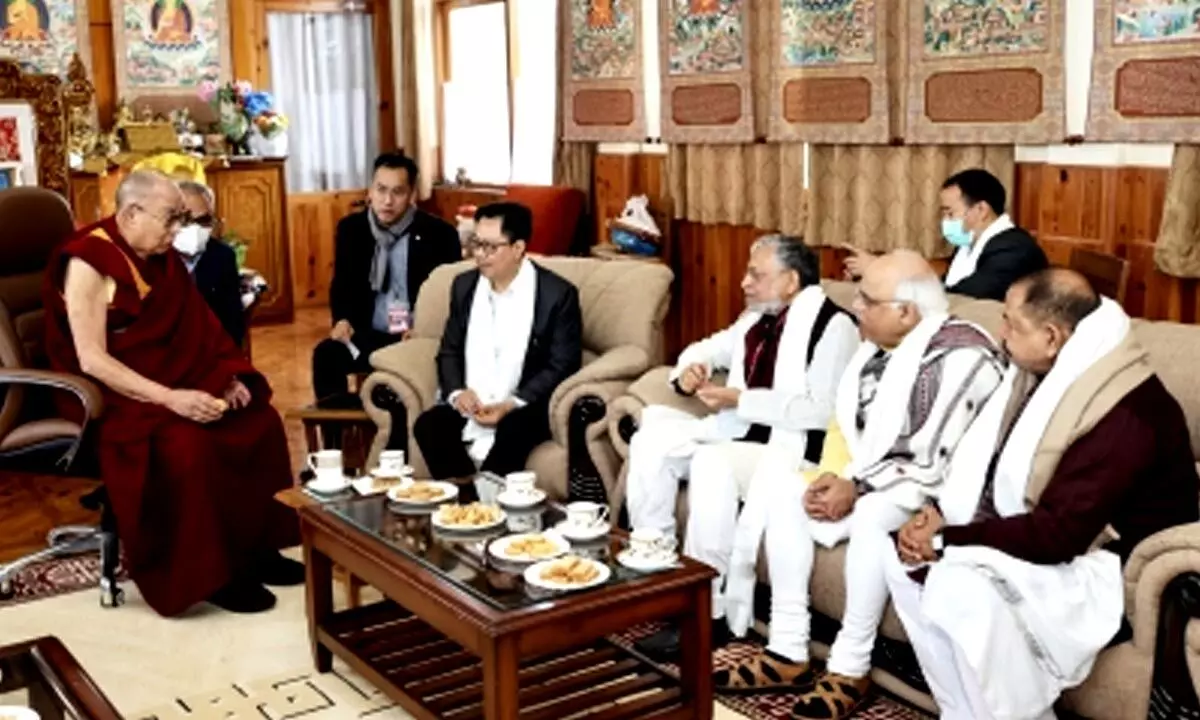Live
- They always want me to win, and now I feel lucky to have been offered a story like ‘Zebra’: Satyadev Kancharana
- ‘Democracy first, humanity first’: PM Modi in Guyana's parliament on two countries' similarities
- PKL Season 11: Telugu Titans register third straight win to top standings
- Is Pollution Contributing to Your COPD?
- NASA Unveils Underwater Robots for Exploring Jupiter's Moons
- Additional Central forces arrive in violence-hit Manipur
- AR Rahman and Saira Banu’s Divorce: Legal Insights into Common Issues in Bollywood Marriages
- 82.7 pc work completed in HPCL Rajasthan Refinery area: official
- Curfew relaxation extended in 5 Manipur districts on Friday
- Tab scam prompts Bengal govt to adopt caution over fund disbursement
Just In
Dalai Lama centre in Bodh Gaya to deepen India-Tibet civilizational link


Dalai Lama centre in Bodh Gaya to deepen India-Tibet civilizational link
The Dalai Lama on Tuesday laid the foundation stone of a world class centre in Bodh Gaya which will study and research Indian traditions that took root in Tibet in the seventh century and spread across the region.
New Delhi: The Dalai Lama on Tuesday laid the foundation stone of a world class centre in Bodh Gaya which will study and research Indian traditions that took root in Tibet in the seventh century and spread across the region.
The decision to set up The Dalai Lama Centre for Tibetan and Indian Ancient Wisdom is a deep geo-cultural move that counters China's bid to Sinicize Tibetan Buddhism.
Unsurprisingly, the global multi-disciplinary centre would be a dedicated centre that will specially focus on "the Indian traditions that took root in Tibet in the 7th century, and were later practiced and propagated by the Dalai Lamas," a statement by the organisers said.
Chinese President, Xi Jinping has earlier called for building an "impregnable fortress" to ensure stability in Tibetan Autonomous Region (TAR) as well as the Tibetan areas in Sichuan, Yunnan, Gansu and Qinghai provinces. He also called for reinforcing China's national security by asking Tibetan people to reject "splittism".
China has long viewed Tibetan Buddhism as the basis of "separatist power", which it has tried to counter with "re-educational patriotism" campaigns, which force Tibetan monks to denounce the XIV the Dalai Lama.
The purpose of the centre would be to promote ancient values that are relevant to solve problems of the digital age. They will provide the toolkit for the sustainable development of the heart and mind, encourage holistic learning, critical analysis, rigorous logic, and systematically cultivated compassion.
It will serve as a single-window for imparting knowledge that will be transformative, opening up broad cultural, philosophical, and academic horizons that will promote the emergence of a harmonious society. "Ancient Wisdom" highlights the special focus of the Centre, inspired as it is by India's unparalleled heritage of ancient philosophical and spiritual traditions, and the vast collection of literature written by ancient scholars in different traditions.
Free from any religious affiliation the centre will promote:
Promote the human values of love, kindness and compassion
Foster a global sense of universal responsibility
Encourage inter-religious harmony among the world's religious traditions
Seek peaceful and non-violent means of conflict resolution
The Centre will promote the Nobel laureate's four life commitments which include compassion, inter-religious understanding, harmony and dialogue and preservation of Tibet's rich spiritual heritage as well as natural environment.
It will study the Tibetan canons known as Kagyur and Tengyur� collections of the Tibetan translation of the 5,000 most important works of diverse Indian saints and scholars, most of which have since been lost in their original Sanskrit. Consequently, the Centre will act as an engine to share this sacred knowledge and promote it across the world, and undertake large scale projects of translation of these Kagyur and Tengyur spiritual and scientific texts into different Indian languages.
The Centre is the product in particular of the fourth life commitment of His Holiness: the promotion of the ancient Indian tradition of philosophy and "inner science" (adhyatma- vidya) and will be one of the most credible and respected learning centres of its kind open to everyone.
The new facility will hold-mind- and life dialogues to explore the rich ancient Indian knowledge of the workings of the mind and emotions, with the help of ancient Indian techniques of mental training, such as meditation, which are of great relevance to cultivate emotional hygiene.
The programmes offered by the centre will be primarily on ancient Indian philosophy, psychology, logic, dialectics, and the 14th Dalai Lama's four principal life commitments.

© 2024 Hyderabad Media House Limited/The Hans India. All rights reserved. Powered by hocalwire.com






